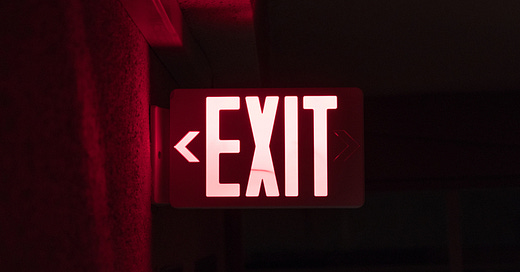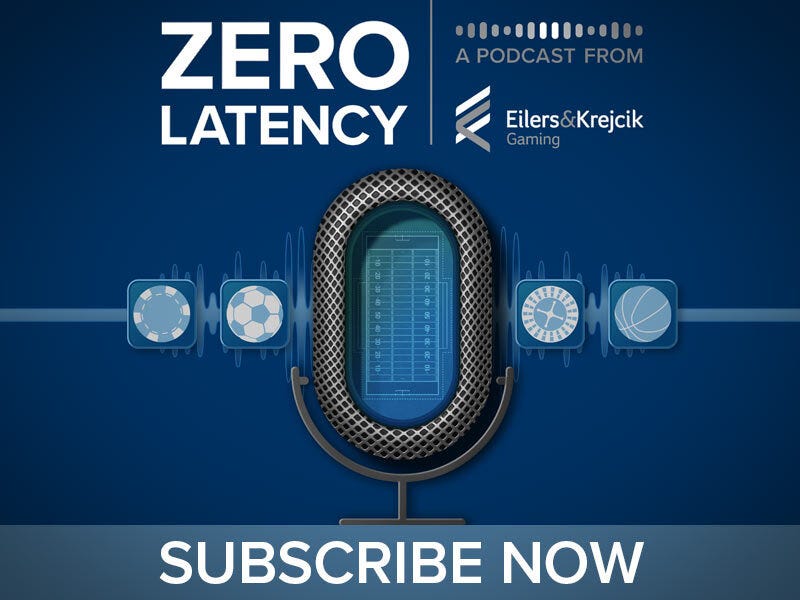We've Got To Get Out Of This Place
Massachusetts will soon be down to six mobile sports betting operators, a far cry from the 12-15 the state expected. Plus, Ohio considers prohibiting prop bets on individual college athletes.
The Bulletin Board
NEWS: Betr and WynnBet want to leave Massachusetts, but state regulators have some questions they’d like answered before cutting them free.
BEYOND the HEADLINE: Massachusetts was supposed to be a competitive sports betting market, so why are there only six operators?
NEWS: The NCAA is asking states to prohibit prop bets on student-athletes, and at least one state, Ohio, is listening.
QUICK HITTER: Eilers & Krejcik Gaming: Nevada will lead the way on Super Bowl betting handle.
NEWS: The AGA’s annual Super Bowl betting prediction has grown a lot in recent years.
AROUND the WATERCOOLER: Questions (for US operators) that need to be answered.
STRAY THOUGHTS: The difference between a pro and a Joe.
SPONSOR’S MESSAGE - Underdog: the most innovative company in sports gaming.
At Underdog we use our own tech stack to create the industry’s most popular games, designing products specifically for the American sports fan.
Join us as we build the future of sports gaming.
Visit: https://underdogfantasy.com/careers
Exit Stage Left: Betr and Wynn Exiting MA
Last week, the Massachusetts Gaming Commission stepped outside, looked around, walked back in, locked the door, looked Betr and WynnBet in the eye, and said, “Now youse can’t leave.”
The two companies submitted notices of intent to cease operations to the MGC, putting the ball in the MGC’s court. Massachusetts requires a 90-day notice or approval from the MGC to cease operation. Both operators asked the MGC to waive the 90-day requirement.
Betr’s exit strategy (submitted to the MGC) targeted a February 16 exit, while WynnBet requested to shutter its mobile app on February 23. The MGC spent more than an hour grilling Betr before it decided to pull the plug for the day and come back at a later time.
As Sports Handle reports, “The requests were the first of their kind in the state, and there were myriad questions around bonuses, deposits, returning funds to consumers, and other issues that Betr and the commission tried to work through.”
It’s rumored the MGC could meet with both companies on Thursday to finalize their exit plans.
Beyond the Headline: MA Inhospitable to Sportsbooks
The industry took a victory lap when Massachusetts legalized sports betting. The state was expected to be a Top 10 market in the US, and the early results haven’t disappointed.
So why are operators avoiding and exiting The Bay State?
As Jessica Welman said on X, “Had you told me that Massachusetts would attract fewer operators than Kentucky, [I] probably wouldn’t have believed you. However, once WynnBet and Betr leave, there will only be six operators in MA, a state that at one expected “dozens” of operator applications.”
Massachusetts received 12 applications for 15 mobile sports betting licenses, which was the first sign the state wasn’t as appealing a target as it was portrayed.
As Welman notes, the state will soon have six active operators.
On top of Betr and WynnBet, Pointsbet and Bet365 withdrew their application. Betway received a temporary license in 2023 but withdrew in 2024, having never taken a bet. Bally Bet renewed its temporary license this year but has never launched.
So, what is going on in Massachusetts?
There are steep financial burdens: A $5 million licensing fee (temporary licenses are $1 million per year) and a 20% tax rate with no promotional deduction. But the bigger issue appears to be the regulatory burdens.
The MGC has implemented advertising restrictions like 21+ on logos and a requirement that 75% of the audience is over 21. It’s also considered, but not enacted, many other policies that make operators cringe.
And it’s not just the strict regulations, although those are certainly frustrating. Because of the state’s open meeting laws, companies spend an excessive amount of time preparing materials and appearing before the MGC to answer questions that could seemingly be dealt with in an email.
Add it all up, and you get six mobile betting operators.
Will Ohio Prohibit College Prop Betting?
The NCAA is paying a lot of attention to sports betting. The organization understands how betting now permeates college sports and the fine line it must walk. It can’t look too cozy with sports betting. At the same time, it understands the opportunity.
One area the NCAA believes it can walk the line between opportunity and keeping the industry at arm’s length is prop bets on individual athletes, which has become one of the organization’s big asks.
“My concern about prop betting is just putting myself in the shoes of a young person who’s on a campus who has a friend or two that come up to them and say, you know, I love you,” Baker told CBS Sports in November 2023. “If you could just miss your first couple of free throws this week, it won’t affect the outcome of the game.”
At least one state is heeding Baker’s concerns.
Per the Columbus Dispatch, the Ohio Casino Control Commission received a letter from the NCAA urging them to prohibit prop bets on college athletes, and Gov. Mike DeWine is on board.
“One year into sports gambling in Ohio, we have seen a marketplace develop where a number of bad actors have engaged in unacceptable behavior by making threats against student-athletes in Ohio and across the country,” DeWine said in a statement. “By amending rules to focus bets on the team and away from individual athletes, I believe we can improve the marketplace in Ohio and better protect student-athletes from unnecessary and potentially harmful threats.”
“I absolutely support Ohio Governor Mike DeWine and NCAA President Charlie Baker and their efforts to change Ohio’s sports wagering rules,” said Ohio State Athletic Director Gene Smith. “Collegiate athletes should not be faced with harmful threats, and changing the wagering rules in Ohio can help put an end to this.”
Many states already prohibit prop bets on college players, and the recent violations in Massachusetts could help the NCAA’s push to get them eliminated nationwide.
Why prop betting? As I wrote in November:
“Considering the existing restrictions, the NCAA could pick up an easy win and signal that it is serious about reining in sports betting. My big question is, will the NCAA take the issue to Congress (a state-by-state approach could prove cumbersome)? That would severely complicate the entire sports betting landscape.”
And as Jessica Welman tweeted, this would be a good issue for sportsbooks to get out ahead of:
Quick Hitter: EKG Estimates $1.25B in SB LVIII Bets
In a flash note published earlier this week, Eilers & Krejcik Gaming (a newsletter sponsor) predicted Super Bowl LVIII will produce $1.25 billion in betting handle nationwide.
Leading the way is Nevada, which will play host to the big game for the first time.
Per EKG, Nevada’s sizable share (13% of EKG’s national handle estimate) “reflects its Super Bowl host-state status and the tourism-driven nature of its sports betting market.”
EKG also highlighted the Super Bowl’s outlier event status regarding in-play betting and SGPs. EKG’s estimate of 10-15% wagered on in-play “is below broader industry averages.” EKG notes that NFL in-play skews lower, and the Super Bowl even lower, due to the influx of recreational bettors the game attracts. It expects a similar result for SGPs.
SPONSOR’S MESSAGE - SUBSCRIBE NOW to Zero Latency, the new podcast from Eilers & Krejcik Gaming that provides unparalleled insight into the U.S. online gambling industry through interviews with industry insiders and analysis from EKG experts.
The AGA Also Has Super Bowl Betting Predictions
The American Gaming Association’s annual Super Bowl betting survey has been released, and the group expects the 2024 game to be the most heavily bet Super Bowl to date.
According to the AGA, “67.8 million American adults (26%) are expected to bet on Super Bowl LVIII, a 35 percent increase from 2023… Bettors plan to wager an estimated $23.1 billion on this year’s Big Game, up from $16 billion last year.”
A few numbers to notice:
42.7 million American adults plan to place a traditional sports wager online, at a retail sportsbook, or with a bookie, up 41 percent from 2023.
36.5 million plan to bet casually with friends or as part of a pool or squares contest, up 32 percent from 2023.
28.7 million adults, or 11 percent, intend to place online wagers using a legal US sportsbook.
As Eric Ramsey pointed out on X, that is nearly a 6x increase since 2021:
Since illegal gambling has always been a part of the equation, either the AGA is calculating these numbers differently, or the original numbers were way, way off.
Around the Watercooler
Social media conversations, rumors, and gossip.
In an interesting thread on X, Chris Grove highlighted some of the questions US sportsbooks are looking to answer during the Super Bowl:
Stray Thoughts
We all know (or went to school with) athletic freaks. And we are often confused when they fail to reach a certain level. I can’t believe that person rode the bench in college. I can’t believe that first-round draft pick didn’t pan out.
But it makes sense. As Brian Scalabrine has said, the big difference between a great athlete and a pro is the ability to process information (starts at about 4:00 minutes below).
The line that sticks out is, “I cannot recover in the NBA. I can’t get beat and use my strength and athleticism to get back in the play.”
The most obvious example is the QB position in the NFL, but this is a skill the best basketball players have. It almost makes them seem superhuman and see things before they happen: Larry Bird, Michael Jordan, and Lebron are all highly talented, physically gifted, and hard-working, but so are most people in the NBA. To Scal’s point, as good as NBA players are at processing information, these all-time players were a little better.
As Scalabrine put it, he’s closer to Lebron than a really good basketball player is to him. The reason isn’t athleticism; it’s his ability to process information.








